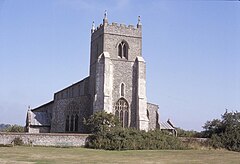Wiveton
| Wiveton | |
|---|---|
 Wiveton church, Norfolk, in 1981 |
|
| Wiveton shown within Norfolk | |
| Area | 4.25 km2 (1.64 sq mi) |
| Population | 127 (201l) |
| • Density | 30/km2 (78/sq mi) |
| OS grid reference | TG042428 |
| Civil parish |
|
| District | |
| Shire county | |
| Region | |
| Country | England |
| Sovereign state | United Kingdom |
| Post town | HOLT |
| Postcode district | NR25 |
| Police | Norfolk |
| Fire | Norfolk |
| Ambulance | East of England |
| EU Parliament | East of England |
Wiveton is a village and civil parish in the English county of Norfolk. It is situated on the west bank of the River Glaven, 3 km (1.9 mi) inland from the coast and directly across the river from the village of Cley next the Sea. The larger village of Blakeney is 2 km (1.2 mi) to the west, the town of Cromer is 20 km (12 mi) to the east, and the city of Norwich is 40 km (25 mi) to the south-east.
Until the 17th century, the River Glaven was navigable and Wiveton was a port. The outline of the former harbour can still be seen in the fields between Wiveton and Cley. Alongside this, marks from mooring ropes belonging to large transport barges can still be seen etched into the wall on the east side of the church.
The civil parish has an area of 4.25 km2 (1.64 sq mi) and in the 2001 census had a population of 158 in 74 households, the population reducing to 127 at the 2011 Census. For the purposes of local government, the parish falls within the district of North Norfolk.
Wiveton was in the national news in 1779 when James Hackman, its newly appointed Rector, was hanged for the murder of Martha Ray, mistress of John Montagu, 4th Earl of Sandwich (the man credited with inventing the sandwich).
Wiveton church has a memorial to Royal Geographical Society Gold Medal Winner Lt. Colonel Frederick Marshman Bailey, one of the heroes of 'The Great Game'.
...
Wikipedia

